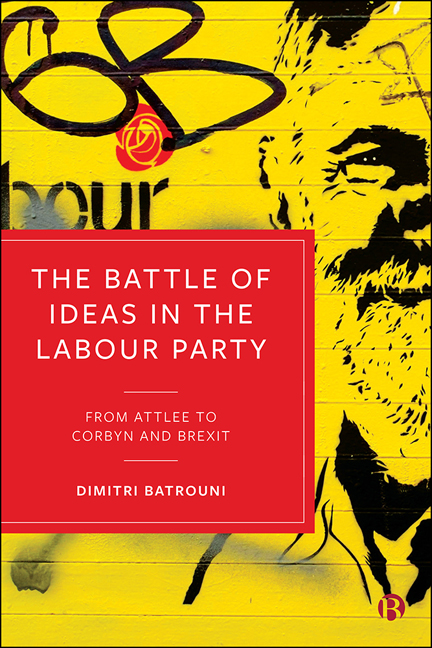Book contents
- Frontmatter
- Contents
- List of Abbreviations
- Acknowledgements
- Introduction
- 1 The Battle of Ideas in the Labour Party, 1945–92
- 2 The Rise of New Labour: Electoral Concerns Trump Ideology
- 3 Bridging the Divide: Ed Miliband and Ideas
- 4 Pre-distribution
- 5 Corbynism: The Left’s Resurgence
- 6 Corbynism: Brexit and Globalization
- References
- Index
6 - Corbynism: Brexit and Globalization
Published online by Cambridge University Press: 10 March 2021
- Frontmatter
- Contents
- List of Abbreviations
- Acknowledgements
- Introduction
- 1 The Battle of Ideas in the Labour Party, 1945–92
- 2 The Rise of New Labour: Electoral Concerns Trump Ideology
- 3 Bridging the Divide: Ed Miliband and Ideas
- 4 Pre-distribution
- 5 Corbynism: The Left’s Resurgence
- 6 Corbynism: Brexit and Globalization
- References
- Index
Summary
A vocal Corbynista MP declared, “New Labour, in my opinion, are responsible for the country voting Brexit, because we lacked an industrial strategy, meaning the communities that were decimated and abandoned by Thatcher and Major's policy continued to be abandoned”. This MP pulled no punches, firmly laying the majority leave vote at New Labour's door. The left believed that New Labour's failure to economically regenerate these areas post-Thatcher combined with its warm embrace of globalization, immigration and its role in the 2008 financial crisis (precipitating the austerity which followed) created the conditions for the leave vote. This view was not uncommon among Corbyn supporting MPs and there was some logic to it. Those on the left categorically laid the intellectual blame on New Labour for following the economic model of neoliberalism; and explicitly wrapped this view within the issues of the EU and globalization. This troika of issues was at the heart of the internal strife of the Labour Party. Yet, these three issues were not equal partners in creating this strife. Different positions on Brexit were the symptom of a growing chasm between MPs, driven in large part by the different demography of their constituencies and how these constituencies, if at all, benefited from globalization and the neoliberal economic model that underpinned it. As we have read, Blue Labour first picked up on this issue as many activists and MPs saw a growing disconnect between working class voters and the party on economic and cultural issues (see Chapter 3); a disconnection that UKIP, the Brexit Party and the Conservatives, under Boris Johnson's leadership, skillfully exploited. It was the right, not the left, in the Labour Party that drove Blue Labour, but the left was also concerned by this disconnection. It was the response to this disconnection where the split was manifested in the party and it was Brexit that forced this disconnection into the open, encapsulating in a single issue the ideological, electoral and economical split in the party. The defining aspect, however, of the divide was on economics, fundamentally between nationalist, protectionist economics and global free trade. It was not on the cultural aspect, because there was little difference between the two sides within the party; they both supported the socially liberal stance of accepting the cultural consequences of globalization.
- Type
- Chapter
- Information
- The Battle of Ideas in the Labour PartyFrom Attlee to Corbyn and Brexit, pp. 151 - 174Publisher: Bristol University PressPrint publication year: 2020



